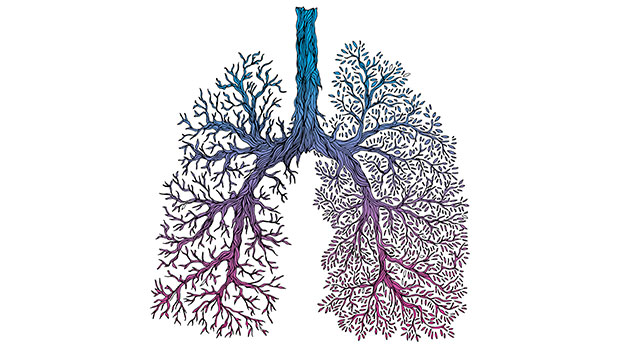
Today, Cancer Research UK has announced TRACERx EVO, a new programme that builds on the discoveries made in the world’s largest long-term lung study, TRACERx.
Started in 2014, TRACERx was our flagship investment in lung cancer research. The largest and most detailed genetic study of its kind in lung cancer, TRACERx was awarded over £10m to investigate how lung cancer evolves over time and why treatments sometimes stop working.
Over 8 years on, the impact of TRACERx continues to grow – and Professor Charles Swanton, lead investigator for TRACERx and TRACERx EVO, knows that this is just the beginning.
“The results we’ve seen come out of TRACERx over the past nine years have been remarkable, and I suspect we’ll still be analysing data from TRACERx for another decade at least,” said Professor Swanton.
“Now, through the TRACERx EVO programme, we will endeavour to bring a deeper biological understanding of lung cancer evolution, prevention, diagnosis and treatment to the clinic.
“By increasing our collective understanding of lung cancer evolution, drug resistance, metastasis and immune evasion, we hope to contribute to advancements in prognostic approaches and therapeutic strategies in this hard-to-treat disease area.”
Led by an international group of researchers, this new programme will continue to transform the field of lung cancer research through data sharing, development of new technologies, and training the future leaders in lung cancer research.
TRACERx: a national effort with global impact
Eight years ago, a clinician scientist approached us with a radical research proposal.
The idea stemmed from the premise that not all cancer cells within a tumour are the same, so biopsies used for diagnoses don’t always show all the defects present in the tumour cells.
What’s more, tumours often evolve over time, which can lead to drug resistance and treatment failure. It’s a huge challenge, both in the clinic and in the cancer research field in general. One that Professor Swanton was ready to rise to.
TRACERx became our biggest investment in lung cancer to date – a highly collaborative project supported by infrastructure in place at the Francis Crick Institute, University College London and the University of Manchester.
The nine-year programme would study the evolution of lung cancer in unprecedented detail, from diagnosis through the disease relapse, with the aim of learning how to treat people based on the individual characteristics of their cancer.
The scale of the programme matched its ambition, with 250 investigators based at 13 hospital sites across the UK analysing blood and tumour samples from 815 people with non-small cell lung cancer. It’s a national effort with significant global impact.
Thanks to TRACERx, researchers can now predict whose lung cancer will return after surgery by detecting tumour DNA in the blood and who may need additional therapy after surgery to help prevent the disease returning. They can also develop tests that use machine learning to predict clinical outcomes at the point of diagnosis.
Our understanding of how lung cancer develops has also improved greatly thanks to the TRACERx data. Researchers showed that cells within a tumour evolve differently depending on how many immune cells they’re surrounded by, and they were able to identify several different tactics tumour cells use to avoid being detected by the immune system.
Most recently, Professor Swanton presented results from TRACERx revealing how tiny pollutant particles in the air cause inflammation in the lungs that can lead to cancer, fundamentally changing how we view lung cancer in never smokers.
And the clinical data generated from the 815 participants has been sent to external organisations around the world, sparking new collaborations that are shaking up the research and clinical landscape in lung cancer and beyond.
But now, with the project coming to a close, the team are looking ahead to how they can build on the legacy of their initial study and significantly improve the outlook for people with lung cancer.
TRACERx EVO: a new frontier
The next chapter in this story is bigger and even more ambitious.
The seven-year TRACERx EVO programme has been awarded £14.9 million in funding by Cancer Research UK and the UCL Biomedical Research Centre to drive another step change in the way we understand and treat lung cancer.
The newly established TRACERx EVO consortium involves international experts from across Europe and North America – combining world-leading scientific and clinical expertise to build on the wide-reaching foundations laid by TRACERx.
The ambitious programme will pursue multiple avenues of research. For example, they will continue to explore how the environment around the tumour affects lung cancer development.
They will dig deeper into their initial discovery about how air pollution may cause lung cancer in people who have never smoked. And they will push boundaries in the development of new tools and technologies that can search for clues in the unique and complex datasets that they produce.
They will also be dedicating some of their resource to study cancer cachexia – the crucial but poorly understood syndrome that occurs in up to 80% of people with advanced cancer, leading to weakness, inability to tolerate therapy and ultimately poor quality of life.
All this work requires even more data, so the programme aims to recruit 450 patients in two cohorts. One cohort of people with early-stage non-small cell lung cancer that can be removed by surgery and one of people with late-stage NSCLC that cannot be removed by surgery or that has already spread to another area of the body.
Having these two cohorts will allow for comparison of tumours between early- and late-stage disease, to unpick lung cancer tumour evolution in more detail than ever before.
A transformative programme
By investing in TRACERx EVO, Cancer Research UK is renewing its commitment to fully elucidating how lung tumours behave, evolve and spread.
The data and resources generated through TRACERx EVO will only serve to amplify the reach of TRACERx, allowing cutting-edge research to develop using data from these ground–breaking programmes and accelerating progress in the field of lung cancer for many years to come across the globe.
Kat






